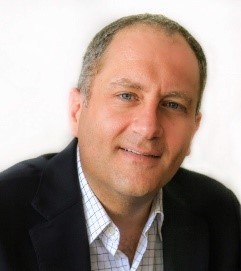Nexus Interview Series // Introducing the Nexus Dialogue Programme and the People behind it: Antonio Levy
With this interview series, we aim to provide a better picture about the people working for the Nexus Dialogue Programme and their individual perspectives on WEF Nexus challenges and opportunities based on their personal experiences. The Nexus team is active in five regions: Central Asia, Latin America, MENA, Niger River Basin and Southern Africa. To get to know the people behind it better, we ask the three same questions within each interview: What does WEF Nexus mean to you and how would you describe it in one sentence? What are the main Nexus challenges in the respective region? In your opinion, what is the most promising approach for implementing/ mainstreaming WEF Nexus in the respective region? In this interview you will get to know Antonio Levy, Regional Coordinator in Latin America and the Caribbean.

What does WEF Nexus mean to you and how would you describe it in one sentence?
The WEF Nexus is a novel approach that challenges the established sectoral silos of water, energy and food, in favor of a more collaborative analysis for developing wholistic solutions. It’s a lot to say in one sentence, but it encompasses the efforts to promote “win-win” solutions to the challenges brought forth at the intersection of these three sectors.
What are the main Nexus challenges in the LAC region?
In the LAC region, the main Nexus challenges are related to creating the spaces for fostering effective interaction between the three sectors, each of which will typically consist of various government agencies as well as civil society organizations. The LAC region is fortunate to have one of the highest percentages of hydroelectric generation capacities in the world, as well as some of the highest potential in this area, hence one of the main challenges will be developing said potential in a manner that promotes the welfare of all the sectors that are impacted by these projects. As a region with one of the highest disparities in income distribution, this also means bringing actors with vastly different levels of economic and political weight to the same table to work together.
What is the most promising approach for implementing/mainstreaming WEF Nexus in the region and why?
There is a lot of potential for implementing WEF Nexus and growing its impact in the region. Latin America relies on moderately high rates of connectivity, similar cultures, and a well-respected implementation partner throughout the region, the Economic Committee for Latin America of the United Nations, ECLAC. Virtual or online events are therefore a very promising approach to implementing the WEF Nexus to generate a network among professionals in different countries, industries, and sectors, through focused, frequent, and open virtual forums. This format allows reaching an unprecedented number of professionals across government, academia and industry, while minimizing the climate impact associated with travelling to large events.
Together with virtual forums, we are working on developing a virtual course that may serve as a free-of-cost toolbox for professionals across the region that will help raise the capacity level in the region as well as generate or organize the relevant knowledge in the field
Both of these will also help showcase the latest advancements and research from Germany and the rest of the world and explore their application for real problems in the region.
Working to advance the level of knowledge, specific studies are being carried out to understand the impact of the Nexus approach and develop clear guidelines to implement it across the region, focusing as much as possible on the specific requirements of the subregions within the hemisphere.

Antonio Levy has more than 20 years of experience in international cooperation in the areas of renewable energy, program coordination, finance, and project management. He has completed degrees in Mechanical and Industrial Engineering, and in Business Administration, as well as advanced studies in Project Management. As GIZ Senior Advisor, he is the Regional Coordinator for Latin America of the Nexus and the GET.transform programmes, both in close partnership with the United Nations Economic Commission for Latin America – ECLAC, and is based in Santiago, Chile.
